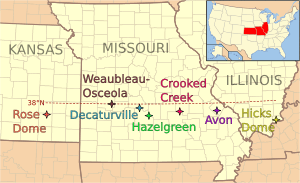38th parallel structures facts for kids
The 38th parallel structures are a fascinating series of round-shaped areas on the ground. They stretch for about 700 kilometers (435 miles) across parts of Illinois, Missouri, and Kansas in the United States. These unique shapes are found near the 38 degrees north latitude line.
|
|||||||||||||||||
Contents
Mysterious Shapes on Earth
These interesting landforms are often called the 38th parallel lineament. They are basically circular dips or changes in the Earth's surface. They are found along a specific line of latitude in the central United States.
Are They From Space?
One idea is that these structures were made by a series of meteorite impacts. Imagine several space rocks hitting the Earth one after another! This idea was suggested by scientists Rampino and Volk in 1996. They thought this might have happened a very long time ago, around 320 million years ago. This time period is known as the late Mississippian or early Pennsylvanian periods.
However, it's hard to figure out the exact age of many of these structures. Also, some geologists (scientists who study Earth) aren't sure if all of them were caused by impacts from space. As of 2016, only two of these structures are officially listed as confirmed impact craters. These are the Crooked Creek and Decaturville craters, both located in Missouri.
Or From Inside Earth?
Other scientists believe that at least some of these features came from deep inside the Earth. For example, Hicks Dome in Illinois seems to be volcanic in origin. This means it was formed by processes involving hot molten rock.
These features are often connected to faults (cracks in the Earth's crust) and fractured rock. You can also find igneous rocks (formed from cooled magma or lava) and valuable mineral deposits nearby. Hicks Dome itself is a type of structural dome. Its central part, made of older rock, has been pushed up about 4,000 feet compared to the rocks around it. There are also small dikes (sheets of igneous rock) around its edges.
Why Do Scientists Care?
Scientists became very interested in the idea of multiple impacts on Earth after a famous event in 1994. That year, a comet Shoemaker–Levy 9 broke apart and crashed into the planet Jupiter. This made people wonder if something similar could happen on Earth.
However, Earth's gravity is much weaker than Jupiter's. This means it's very unlikely for a speeding object to get close enough to Earth to be torn into pieces by gravity before hitting. Even so, we can see evidence of multiple impacts on the Moon. The Moon's gravity is even weaker than Earth's, but it has several chains of craters on its surface. These chains suggest that objects have broken up and hit the Moon in a line.


